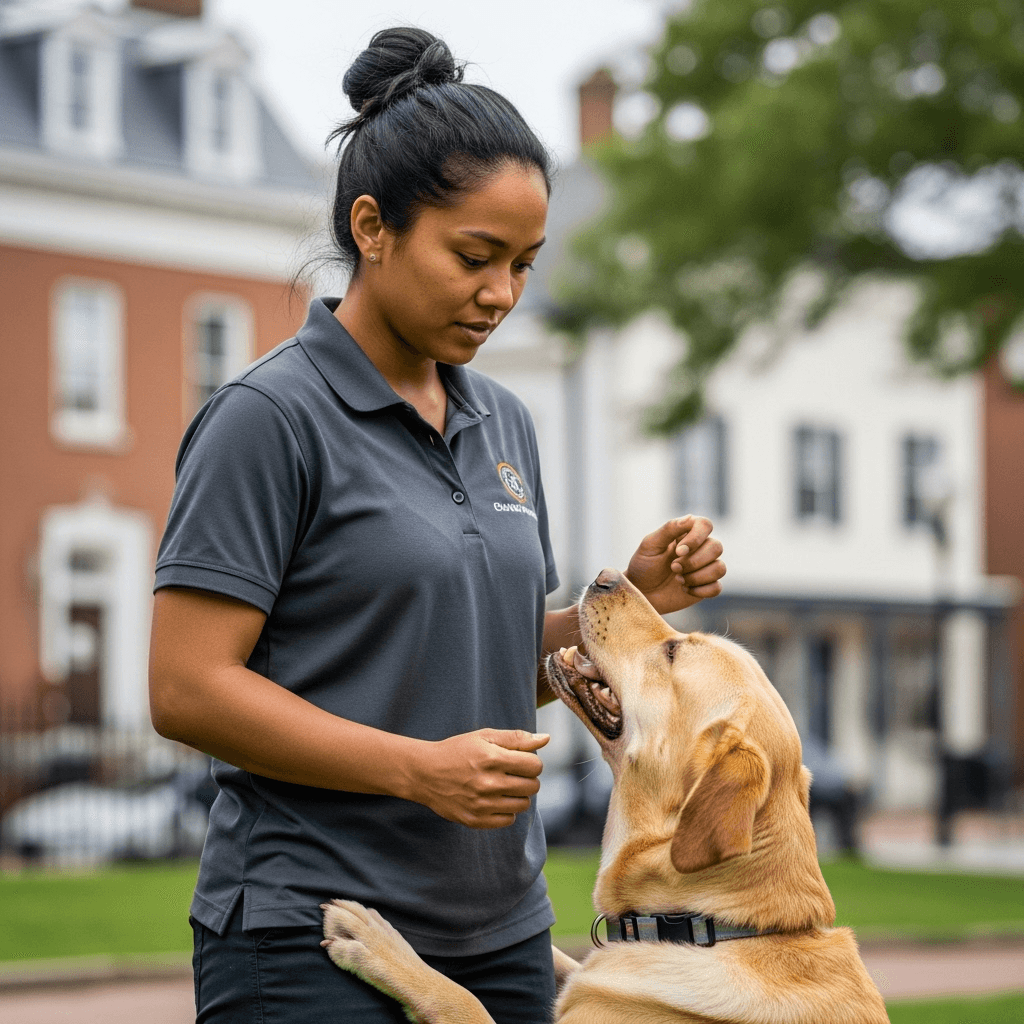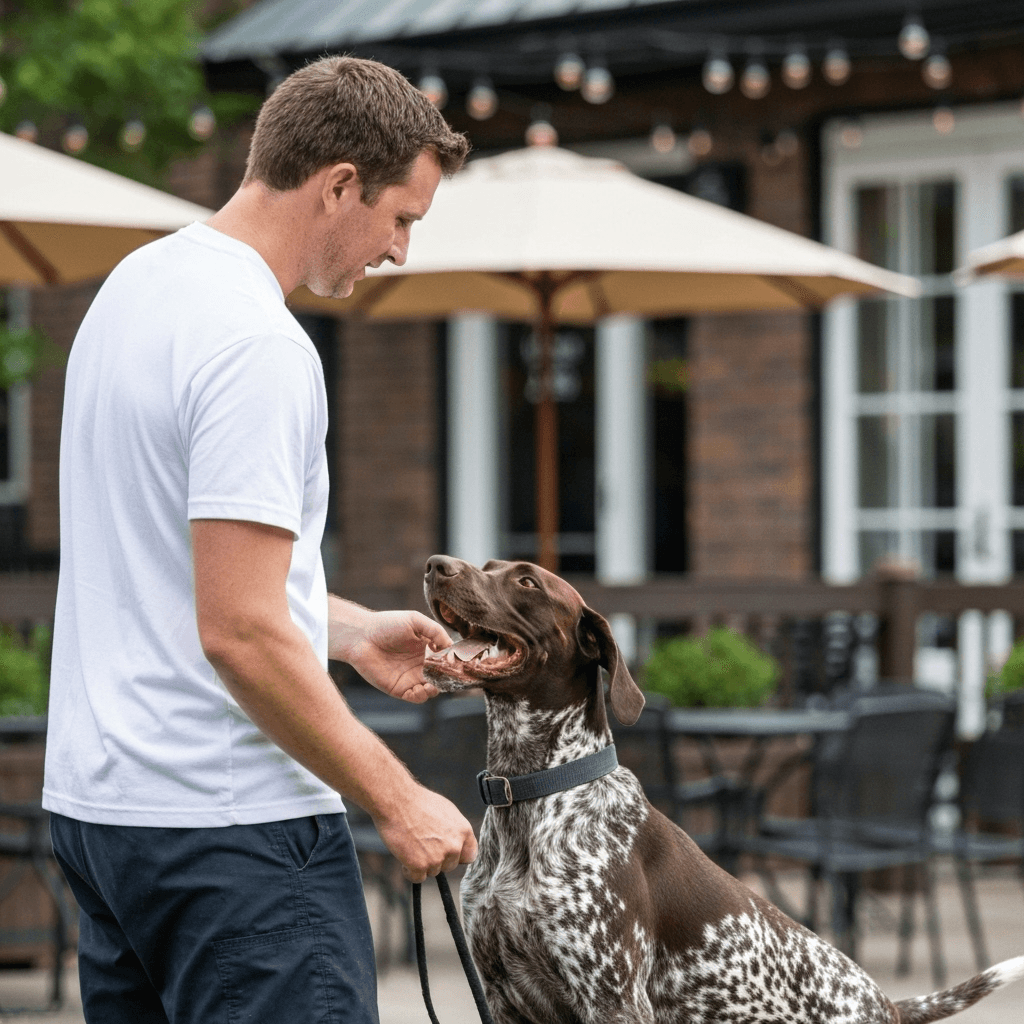Your Complete Guide to Choosing a Dog Trainer in Connecticut
Living with a dog in Connecticut means navigating everything from dense suburban neighborhoods to rural farmland, from coastal walks to mountain trails. Your dog needs to handle busy town greens, crowded farmers markets, and encounters with wildlife like deer and turkeys. Finding the right professional dog trainer means working with someone who understands these specific Connecticut challenges.
Connecticut’s mix of city life, suburban sprawl, and rural communities creates unique training needs. A dog living in New Haven faces different challenges than one in Litchfield County’s countryside or along the shore in Guilford. The right training program prepares your dog for your actual daily life, whether that’s navigating downtown Hartford sidewalks or staying calm during summer beach visits.
How to Choose the Right Trainer
Start by looking for someone who uses positive reinforcement training and understands Connecticut’s lifestyle demands. Your dog should learn to walk politely through crowded downtown areas, remain calm during outdoor dining on patios, and handle the unpredictable weather transitions that come with New England seasons.
Credentials help you evaluate a trainer’s education and commitment to staying current. Common dog trainer certifications include KPA-CTP, CPDT-KA, or IAABC-CDBC for behavior problems. If your dog shows serious aggression or reactivity, look for someone with CBCC-KA or a science-based program like CTC.
In-home dog training works best for puppy training, door manners, and neighborhood leash skills. Group classes make sense once your dog can focus around other dogs, especially before trying busy locations like town greens or summer festivals.
Ask about the trainer’s experience with Connecticut-specific situations. Do they understand local leash laws? Have they worked with dogs who need to navigate icy sidewalks, handle leaf-blower season, or stay calm around lawn service trucks?
Common Dog Training Methods Explained

Reward-based methods build trust while creating lasting behavior changes. They also help you follow Connecticut’s municipal regulations about keeping dogs under control in public spaces.
Basic obedience covers sit, down, stay, place, recall, and leash training so your dog can handle walks through historic districts, visits to outdoor shopping areas, and busy parks without pulling or jumping on strangers.
Puppy classes focus on socialization, potty training, bite control, crate comfort, and early leash manners. Starting with short, positive training sessions prevents bad habits from forming during those critical early months.
Behavior modification addresses fear, reactivity, resource guarding, or separation anxiety through careful desensitization and counterconditioning. For serious cases, ask if your trainer works with local veterinarians or veterinary behaviorists.
Private lessons let you customize everything around your daily routines and specific goals. Day training can speed up results when you’re short on time, with the trainer working your dog during the day and teaching you how to maintain progress.
Dog training classes help your dog practice good manners around other dogs and people. The best group classes give dogs plenty of space, screen participants carefully, and teach calm behavior rather than just excitement.
Specialized training like therapy dog training or service dog training requires extra structure, public-access skills, and a very clear step-by-step training program.
Stay away from trainers who use fear, intimidation, or pain to get results. Humane methods are safer for everyone, easier to maintain long-term, and much better for building a well-behaved dog you can trust in any situation.
Average Cost of Dog Training in Connecticut (Updated for 2025)
Prices across Connecticut vary based on the trainer’s experience, session length, location, and whether you’re in a metro area like Fairfield County or a more rural region. Here’s what most Connecticut dog owners are paying in 2025.
| Service Type | Average Cost (Connecticut) |
|---|---|
| Puppy classes (4-6 weeks) | $175-$325 total |
| Group obedience classes (4-6 weeks) | $180-$350 total |
| Private lessons (60-90 min) | $125-$225 per session |
| In-home coaching packages (4-6 visits) | $475-$1,050 total |
| Day training (per week) | $500-$1,100 per week |
| Behavior consult for reactivity/anxiety (initial) | $175-$300 |
| Board and train (2-4 weeks) | $2,200-$5,000 total |
You’ll likely pay higher rates in Fairfield County and other areas closer to New York, with more moderate pricing in eastern and northern Connecticut. Travel fees may apply for trainers covering wider service areas.
Make sure you understand what’s included in the price, how the trainer tracks progress, and whether they offer a free consultation or free evaluation before you commit to a full training program.
Questions to Ask a Potential Dog Trainer
- What training methods do you use, and how do you keep sessions positive and low-stress?
- What credentials do you have, like CPDT-KSA or KPA-CTP? Do you keep up with continuing education?
- How will you customize the training plan for my dog’s specific needs and our Connecticut lifestyle?
- Do you offer in-home visits, dog training classes, or day training, and which approach fits my goals best?
- How will we measure my dog’s progress and know when to add more distractions?
- What are the total costs, including any travel fees, and what’s your cancellation policy?
- Do you carry liability insurance, and can you show me proof?
- For behavior problems, will you work with my veterinarian if needed?
- What should I practice between training sessions to help my dog keep improving?
- Have you worked with dogs who need to handle Connecticut-specific situations like crowded beaches, town events, or wildlife encounters?
Local Connecticut Rules and Considerations
Connecticut towns enforce their own leash laws and nuisance ordinances, so rules vary depending on where you live. Most municipalities require dogs to be leashed in public spaces, but specific regulations differ by town.
The state requires current rabies vaccination for all dogs, with proof available on request. Connecticut law mandates that dogs receive their first rabies vaccine by age six months, with boosters following veterinary guidelines. You can find details through the Connecticut Department of Public Health.
Dog licenses are required in most Connecticut towns and must be renewed annually. Contact your town clerk’s office for specific requirements and fees, which typically range from $8 to $19 depending on spay/neuter status.
Excessive barking can be considered a public nuisance under local ordinances. Work with your trainer on alert barking and separation anxiety before neighbors file complaints with animal control.
Connecticut doesn't require special licenses for dog trainers. If a trainer offers board and train services, their facility may need to meet kennel licensing requirements through the Connecticut Department of Agriculture.
Many towns prohibit dogs from beaches during summer months, typically from May through September. Check your local regulations before planning beach training sessions.
Local Connecticut Resources for Dog Owners
These locations give you great places to practice polite manners, work on recalls, and provide safe enrichment for your dog. Always follow posted rules and etiquette guidelines.
- Rockwell Park Dog Park in Bristol offers separate fenced areas for large and small dogs with double-gated entries for safety
- Waveny Park Dog Park in New Canaan provides a spacious off-leash area perfect for recall practice during quieter hours
- Veterans Memorial Dog Park in Stamford features well-maintained grounds and active community involvement
- Sleeping Giant State Park in Hamden welcomes leashed dogs on trails, offering excellent opportunities to build focus around other hikers and wildlife
- Wadsworth Falls State Park in Middletown allows leashed dogs on trails and picnic areas, giving you diverse environments for training
- Connecticut Humane Society locations across the state offer resources, lost pet services, and community support for dog owners

FAQs
How much does in-home dog training cost?
Most Connecticut trainers charge $125-$225 per in-home visit, with package discounts available when you buy multiple sessions. Behavior modification for aggressive dog training or reactivity typically starts at the higher end of that range.
Is in-home dog training worth it?
Absolutely, because you’re addressing problems exactly where they happen. Your trainer can fix door manners, jumping on guests, counter-surfing, and yard reactivity right at home, then step outside to practice leash skills on your actual neighborhood streets and sidewalks.
Can you pay someone to house train your dog?
Yes, many expert dog trainers offer puppy programs that include potty training, crate routines, and daily schedules. Day training can speed up the process while teaching you how to maintain the progress between training sessions.
What is the 3-3-3 rule for dog training?
This is a helpful timeline for new or adopted dogs: expect about 3 days for your dog to decompress, 3 weeks to learn your routines, and 3 months to feel completely settled. Good dog training services work with this natural adjustment period rather than rushing the process.
How long will it take to reach my training goals?
Most puppies and friendly adult dogs show solid progress within 4-8 weeks if you practice daily. Fear, reactivity, or aggression typically requires several months of careful behavior modification with gradual increases in difficulty and distraction levels.
What should I bring to group classes?
Pack a flat collar or harness, a 6-foot leash, high-value treats, water, and current vaccination records if your trainer requests them. Leave retractable leashes at home for safety reasons.
What’s the leash law in Connecticut?
Leash laws vary by municipality, but most Connecticut towns require dogs to be leashed and under control in all public spaces except designated dog parks. Check your town’s specific ordinances through your local animal control office or town website.
Do I need a dog license in Connecticut?
Yes, nearly all Connecticut towns require annual dog licenses. Contact your town clerk’s office for registration requirements, fees, and deadlines. You’ll typically need proof of current rabies vaccination to obtain or renew a license.
What shots does my dog need in Connecticut?
Connecticut law requires rabies vaccination for all dogs over six months old. Your veterinarian may also recommend distemper-parvo, bordetella, leptospirosis, and Lyme disease vaccines based on your dog’s lifestyle and risk factors. The Connecticut Department of Public Health provides additional guidance on rabies requirements.
Are dog trainers required to be licensed in Connecticut?
No special licenses exist for dog trainers in Connecticut. Trainers follow normal business regulations, but if they offer boarding services as part of board and train programs, their facility may need to be licensed as a kennel through the Connecticut Department of Agriculture.
Where can I practice off-leash recall?
Use fenced dog parks throughout Connecticut to keep things safe and legal while working on off-leash obedience training. Try visiting during quieter morning hours when you’re starting out with recall work.
Which dog parks allow training around Connecticut?
Most Connecticut dog parks welcome training activities as long as you’re not running a commercial class. Rockwell Park in Bristol, Waveny Park in New Canaan, and Veterans Memorial in Stamford all allow individual training work within their fenced areas.
What beaches or trails allow dogs for training?
While many Connecticut beaches prohibit dogs during summer months, most state parks and forests welcome leashed dogs year-round. Sleeping Giant State Park and Wadsworth Falls State Park both offer excellent trail systems for building focus around other hikers, cyclists, and wildlife. Check individual park regulations before visiting, as some areas may restrict dogs from certain sections.
How do I find a certified dog trainer near me?
Look for trainers who hold recognized credentials and use positive reinforcement methods. Check their websites for certifications, read reviews from other Connecticut dog owners, and schedule a free consultation to discuss your goals and evaluate their approach.
What if my dog has separation anxiety?
Work with a professional dog trainer who has experience with behavior modification for anxiety-related issues. Treatment typically involves gradual desensitization, counterconditioning, and sometimes collaboration with your veterinarian for cases that may benefit from medication support.
The right combination of thoughtful planning, humane methods, and consistent practice around Connecticut’s diverse environments will help your dog become a confident companion. Whether you’re navigating busy Fairfield County towns, exploring Hartford’s parks, or enjoying the quieter pace of rural areas, proper dog obedience training builds the foundation for a top dog who’s welcome everywhere you go.
